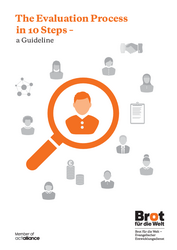
We Share Results and Learn from Them
Brot für die Welt (Bread for the World) is a transparent and learning organisation. We value external perspectives on the results and impacts of the work of Brot für die Welt and its partner organisations. Evaluation results allow us to take evidence based decisions. A culture of evaluation shared by and systematically rooted within all parts of the organization is important to us.
Why We Evaluate
Evaluations at Brot für die Welt fulfill two central functions. We conduct evaluations to learn as well as to be accountable. Staff of partner organisations who implement projects, as well as Brot für die Welt’s staff accompanying them learn from evaluations. They use findings and recommendations of external evaluators to improve the quality and effectiveness of projects and to further develop their programming work. Additionally, evaluations make the work of partner organisations and Brot für die Welt transparent. With evaluations, we render account not only to our donors, but also to the public and to supported communities and groups.
How We Evaluate
For Brot für die Welt, the "Guidelines of Outcome and Impact Orientated Results Measurement in the Field of Promotion of Churches' Developmentally Important Projects" of the Federal Ministry for Economic Cooperation and Development (BMZ) and the Evaluation Concept of Brot für die Welt provide the framework for evaluations. Brot für die Welt’s evaluation guideline (PDF) [744kB] with checklists and support material for the several steps of the evaluation process serves to ensure that evaluations follow Brot für die Welt’s quality standards. Brot für die Welt's evaluations are planned and implemented based on the Standards of the Evaluation Society (German, PDF) [420 kB] and the OECD/DAC Quality Standards for Development Evaluation [423 kB]. Furthermore, the OECD/DAC Evaluation Criteria are taken into account in Brot für die Welt’s evaluations. This means in our evaluations we usually assess whether:
- the project approach is appropriate? (relevance)
- the project aligns with other interventions in the geographic area, sector, or institution? (coherence)
- the project objectives are achieved? (effectiveness)
- the project objectives are achieved in a cost effective way? (efficiency)
- the measures have the desired effect? (impact)
- the benefits of the project are long-term? (sustainability)
When selecting evaluators, Brot für die Welt’s most important criteria are their regional, sectoral and methodological competence as well as their independence. In addition, they must respect the human rights and dignity of all persons involved (ethical data collection practice) and apply a participatory approach in their evaluation work. In all evaluations, the key issues of gender and, where possible, inclusion and environmental impacts are taken into account. It is also important to us that evaluation teams are gender mixed and consist of evaluators from the Global North and South.
Cross-Project Evaluations
In addition to project evaluations commissioned by our partner organisations, we also conduct evaluations across projects, for example of programmes, funding areas or instruments. These complex evaluations provide answers to overarching and strategic questions. We distinguish between the following types of evaluation:
- Cross-sectional evaluations assess multiple projects or programmes with regard to a specific question or topic. They are often focused on a specific sector or region, for example vocational training in West Africa. However, they may also assess a specific type of intervention.
- Funding area evaluations assess projects of a particular funding area and are agreed upon between the BMZ and the churches’ Central Offices for Development Co-operation as a joint instrument for reviewing success.
- Strategic evaluations evaluate strategies, policies, instruments and structures of the organisation.
- Meta evaluations assess the quality of project evaluations. Every meta evaluation has a specific focus, for example use of and learning from evaluation results.
Compilation of Evaluation Reports
The evaluators summarise their evaluation reports in anonymised form. These summaries contain a short description of the organisation carrying out the project and of the evaluated project itself. They describe the objectives of the evaluation as well as the evaluation methodology and outline the key findings and recommendations along the OECD/DAC evaluation criteria.
Anonymised summaries in English language of evaluations accompanied by the evaluation team at Brot für die Welt since 2017 can be found here.
An overview of the evaluations planned by the evaluation team at Brot für die Welt as well as current tenders are published on the German website.
Downloads



